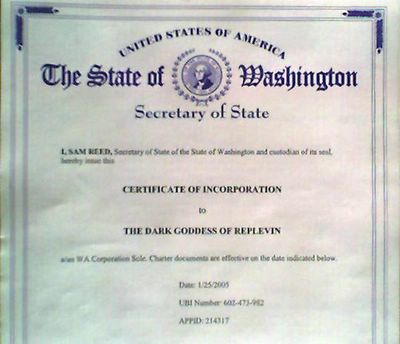This question arises because, only a month after incorporating the dark goddess of replevin as a corporation sole (see below), I have been asked to perform a wedding ceremony. I'm delighted, of course, but I take such a responsibility seriously. So I checked to see if this power was, in fact, one consequence of my new corporate identity.
First, there aren't many formal requirements for a ceremony. In the solemnization of marriage no particular form is required, except that the parties thereto shall assent or declare in the presence of the minister, priest or judicial officer solemnizing the same, and in the presence of at least two attending witnesses, that they take each other to be husband and wife. RCW 26.04.070. There's also a form I have to file in two places. Research reveals that in Washington state, any regularly licensed or ordained minister or any priest of any church or religious denomination has the power to perform marriage ceremonies. Hm. Am I "regularly licensed or ordained"? Am I "a priest[ess] of a * * * religious denomination"? Um, well, yes, but I kind of appointed myself.
For the state of Washington to make a determination that my action wasn't sufficiently "religious," however, would turn into a huge Free Exercise problem even under the federal constitution. Washington state's constitution has an unusually broad Free Exercise Clause: "Absolute freedom of conscience in all matters of religious sentiment, belief and worship, shall be guaranteed to every individual, and no one shall be molested or disturbed in person or property on account of religion; but the liberty of conscience hereby secured shall not be so construed as to excuse acts of licentiousness or justify practices inconsistent with the peace and safety of the state." (There's more as we hunker down into the state's Establishment Clause, but not germane to my point.)
In addition, the authority of the officiating officer at the marriage and all other prerequisites to a valid marriage shall be presumed in absence of evidence to the contrary. Summerville v. Summerville, 31 Wash. 411, 72 P. 84 (1903). Fortunately, I don't have to worry about ecclesiastical malpractice. As long as I say I am a minister or priest[ess], the marriage is valid as long as one of the parties believes me. This statute would elimate one of the major plotlines in the romance novels I used to read while travelling on trains. The only reported case I could find on this issue was from 1909, in which an "Indian chief" who was a Presbyterian, although apparently not a minister, was assumed to have the authority to marry people. Weatherall v. Weatherall, 56 Wash. 344, 105 P. 822 (1909). Moreover, the state of Washington was asked its opinion about this matter in 1971, and basically ducked the question, or at least came to the same conclusion that I did, which is that if I cobble together a philosophy and consider it my personal religion, the state has no business crying bullshit on me. After all, as John H. Bright, Assistant Attorney General of the State of Washington concluded in 1971, "the more important thing in a marriage is the capacity and intent of the parties thereto" and not the credentials of the individual signing the marriage license. Isn't that really the most sensible way to look at this issue?
I do, however, have to worry about a hundred dollar fine (or up to five hundred bucks if I really tick the judge off) if I purport to be able to perform valid marriages when I can't.
But wait. If the marriage I perform is valid regardless, when would such a fine ever be levied? In more analytical terms, doesn't apparent authority create actual authority in this area? This stuff is making my head hurt.
Because marriage in the state of Washington is regulated purely as a civil contract, and the ecclesiastical aspects are left to the various churches, I don't think my credentials matter. I speculate that the requirement that ceremonies be perfomed either by judges or ministers was originally imposed so that relatively reliable people would be in charge of watching out for octagenarians trying to marry children, first cousins marrying one another, and intoxicated people tying the knot improvidently. As a divorce lawyer, I actually have pretty good credentials for assessing whether a proposed marriage would be invalid, and as a mother I would certainly never perform a marriage ceremony for a child.
All in all, however, working the seam between church and state continues to be a very tricky business.
3.03.2005
Subscribe to:
Post Comments (Atom)

1 comment:
I would like to discuss State v. Denton out of WA's Division I with the author, a ruling whose misapplication has grave implication for the institution of marriage in WA State.
amicuscuria.com/wordpress
Post a Comment